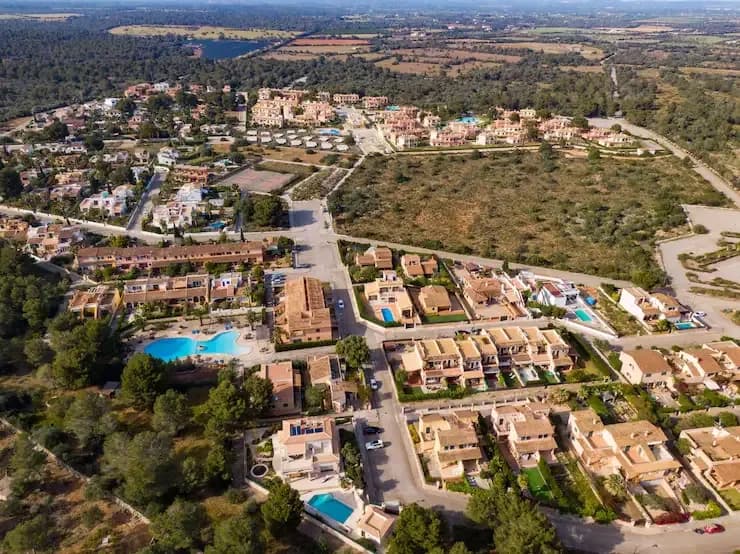Joint ownership of property in Dubai is becoming increasingly popular among investors, families, and business partners. Whether you’re eyeing luxury villas, commercial real estate in Dubai, or residential developments, understanding the nuances of joint ownership of property in Dubai is essential. From legal regulations to shared responsibilities, this comprehensive blog explores jointly owned property declaration Dubai, jointly owned property law Dubai, and the key steps and considerations for co-owners ready to buy property in Dubai.
What Is Joint Ownership of Property in Dubai?
Joint ownership of property in Dubai refers to a scenario where two or more parties hold legal title to a single property. This ownership structure allows all co-owners to enjoy rights and assume responsibilities proportionate to their share. It’s a practical solution for couples, business partners, or groups looking to buy property in Dubai together. The Dubai Land Department (DLD) officially records each owner’s share on the title deed.
Can You Have Joint Ownership in Dubai?
Yes, joint ownership of property in Dubai is fully recognized under UAE law. According to jointly owned property law Dubai, individuals, whether residents, expats, or foreign nationals, can own property jointly. The key is to ensure that your share declaration is properly registered through a jointly owned property declaration Dubai, and compliance with DLD regulations is maintained throughout.
Also read: Commercial Real Estate Development Process
Types of Joint Ownership
When considering joint ownership of property in Dubai, it’s essential to understand the various types available, as each structure carries distinct legal and financial implications. Dubai offers multiple options for structuring joint ownership, and choosing the right one depends on your relationship with co-owners and your shared goals. Whether you’re a married couple securing luxury villas in Dubai or business partners investing in commercial real estate, the form of ownership, ranging from equal shares to detailed partnership agreements, can significantly impact your rights and responsibilities. It’s crucial to analyze these options carefully before finalizing any deal, ideally with the support of property management services or real estate consultation in Dubai.
Equal Undivided Shares
Here, co-owners share equal portions, 50/50 in a two‑person setup, or equally divided among more. This is common for couples and family members investing in jointly owned property.
Unequal Undivided Shares
Co-owners hold different ownership percentages, e.g., 70% and 30%. This allows major investors to retain control while still allowing minority buy‑in.
Tenancy in Common
Each owner holds a distinct share of the property, which can be sold or inherited independently. Shares are clearly defined, and heirs can inherit without affecting other owners.
Joint Tenancy with Rights of Survivorship
Under this form, when one co-owner dies, their share automatically passes to the surviving co-owner(s). This model often appeals to spouses or parent-child joint owners.
Types of Jointly Owned Properties
Dubai’s diverse real estate market accommodates joint ownership across a wide range of property types, each governed by specific rules and regulations. Whether you’re looking to buy property in Dubai’s vibrant urban communities or invest in beachfront luxury villas, it’s important to understand how joint ownership applies to different property categories, residential, commercial, or off-plan. The definitions and legal frameworks for joint ownership can vary slightly depending on the property type, and knowing which structures are supported under jointly owned property law in Dubai is essential. Additionally, understanding how the jointly owned property declaration in Dubai is handled will help ensure compliance and clarity for all co-owners.
Residential Apartments
A popular choice for expats and families. DLD documents the proportion of ownership in the title deed, and jointly owned Properties For Sale In Dubai declaration Dubai ensures transparency.
Villas and Townhouses
Luxury Dubai Villa For Sale and Townhouse For Sale in Dubai are often co-owned by families or partners. Structural responsibilities and maintenance should be clearly defined in shared agreements.
Commercial Real Estate
Commercial real estate in Dubai is frequently co-owned by business partners. Ownership structure affects rental income distribution and decision-making power.
Off‑Plan Units
Many investors choose to jointly own off‑plan projects. Early planning of share percentages helps avoid disagreements when the development is completed.
Also read: Investing in Property for Beginners
Jointly Owned Property Law in Dubai
Understanding legal frameworks is key when dealing with joint ownership of property in Dubai. All owners must adhere to rules set out by the Dubai Land Department and the UAE’s property laws. Whether you’ve signed a jointly owned property declaration Dubai or rely on other forms of documentation, full compliance is essential.
Regulations Governing Joint Ownership
Joint ownership of property in Dubai is regulated by a set of legal provisions designed to ensure clarity, fairness, and transparency among co-owners. The Dubai Land Department (DLD) plays a central role by overseeing title registration and maintaining all official ownership records. It is mandatory for owner share proportions to be explicitly declared and accurately reflected on the title deed. In cases where no joint tenancy clause exists and a co-owner passes away, the deceased’s share may be distributed according to Islamic inheritance laws if no valid will is in place. Foreign ownership regulations also apply, non-GCC nationals are permitted to co-own property, but only within designated freehold areas. Additionally, any mortgages, loans, or liens tied to the property must be collectively declared by all co-owners, ensuring legal and financial transparency in shared ownership arrangements.
Steps to Establish Joint Ownership
Establishing joint ownership of property in Dubai requires coordination between legal documentation, financial institutions, and the DLD. This ensures that the jointly owned property declaration Dubai is formal and compliant. You may need Real estate consultation Dubai or Property management services to streamline this. Key steps include securing a Power of Attorney, defining share percentages on the title deed, obtaining bank approval if there’s a mortgage, and executing compliant cheque or payment procedures. We’ll walk through each step to help you buy property in Dubai confidently, from luxury villas to commercial real estate in Dubai.
Also read: Average Price of a House in Dubai
Power of Attorney (POA) Requirements
If one or more co-owners cannot be present in Dubai, a notarized Power of Attorney allows another partner or legal representative to act on their behalf during property registration.
Cheque Issuance and Title Deed Process
Co-owners must issue a certified cheque covering their share. The DLD will then update the title deed to list all owners and their respective percentages.
Bank Approval and Legal Compliance
If financing is involved, the bank must approve the mortgage application for all co-owners. Lenders often require joint guarantors and documentation, co-ownership structure should align with bank compliance.
Also read: Best Property Developers in Dubai
Responsibilities of Joint Property Owners
Joint ownership in Dubai not only involves shared rights but also comes with shared responsibilities that must be honored by all co-owners to ensure smooth and conflict-free property management. Each co-owner is responsible for maintaining the property and contributing proportionately to ongoing costs such as repairs, utilities, and service charges. If the property is mortgaged, all parties must comply with repayment obligations, as missed payments can impact all owners collectively. Any major decisions regarding the property, such as renovations, lease agreements, or changes in usage should be made jointly, with mutual consent. Transparent communication is essential, especially when managing shared finances or addressing concerns. In the event of disagreements, co-owners should work together to resolve disputes amicably, ideally through mediation or legal consultation if necessary. Upholding these responsibilities helps preserve the value of the property and maintains a harmonious ownership experience.
Selling a Share in Joint Ownership
In Dubai, selling an individual share in jointly owned property is possible, especially under a tenancy in common arrangement. However, the process is regulated to protect co-owners. Remaining owners are usually granted the right of first refusal, giving them the opportunity to purchase the share before it is offered to an external party. Once the sale is confirmed, the title deed must be updated with the Dubai Land Department to reflect the new ownership structure. This includes clearly documenting the new share distribution and legal rights.
All parties involved in the ownership must approve the sale or transfer declaration to ensure transparency and compliance with property laws. Legal consultation is advised to handle the transaction smoothly and avoid disputes. Failing to follow the proper procedures may result in the deal being invalidated or delayed due to regulatory issues.
Also read: Best Residential Buildings in Dubai
Divorce and Joint Property Ownership
Divorce can complicate joint property ownership in Dubai, especially when both spouses hold legal shares. The division of property is typically guided by either a court order or a mutually agreed declaration between the former partners. If one party wishes to keep the property, refinancing the mortgage or buying out the other party’s share may be required. Alternatively, the property may be sold, and the proceeds divided based on ownership percentages or legal rulings. In all cases, the jointly owned property declaration must be updated with the Dubai Land Department to reflect the new arrangement.
This ensures legal accuracy and prevents future claims. Because property disputes during divorce can be emotionally and financially complex, seeking legal advice or mediation is highly recommended. Handling these matters carefully ensures compliance with UAE law and protects the rights of both individuals throughout the transition.
Things to Know When Co‑Buying Property in Dubai
Co‑ buying property in Dubai is a growth area, whether you’re pooling resources with friends, business partners, or family. Understanding the legal, financial, and relational aspects of joint ownership of property in Dubai is critical before signing any contracts. Talk with professionals offering Real estate consultation Dubai to clarify share percentages, dispute resolution, exit strategies, and whether the structure supports your goal, like owning luxury villas in Dubai, commercial real estate in Dubai, or off‑plan units. Good planning reduces unexpected disputes and ensures a smoother co‑ownership experience.
1. Clarify Share Percentages
Define whether ownership is equal or based on capital contribution, and ensure it’s reflected legally.
2. Agree on Exit Strategy
Outline procedures for selling or transferring shares, and who gets buy-out rights.
3. Legal Agreements
Consider shareholding or co-ownership agreements to manage decision-making, distribution of income, and dispute resolution.
4. Maintenance and Management
Designate responsibilities, or enlist Property management services, to handle upkeep, especially for rental properties.
5. Tax and Mortgage Implications
Joint borrowers share liability. Ensure you understand tax and financing obligations for joint ownership of property in Dubai.
Also read: Where to File a Complaint Against Landlord in Dubai
Benefits of Joint Ownership in Dubai
Joint ownership of property in Dubai comes with many advantages, financial flexibility, risk sharing, access to premium properties like luxury villas in Dubai or commercial real estate in Dubai, and easier mortgage approval for higher-value assets. It also opens up opportunities for family wealth building and diversified real estate portfolios. Whether you’re a couple aiming for shared equity or investors aiming for commercial income, joint ownership offers strategic advantages when implemented properly with legal safeguards and thoughtful planning.
1. Shared Financial Burden
Co‑owning divides upfront costs, mortgage repayments, and maintenance expenses, making premium properties more accessible.
2. Access to Higher‑Value Assets
Pooling resources lets co‑owners invest in luxury villas in Dubai or commercial real estate in Dubai investments they couldn’t afford solo.
3. Tax Efficiency
Depending on your structure, jointly owned properties may offer tax advantages and facilitate wealth-sharing among partners.
4. Estate Planning
Joint tenancy with rights of survivorship ensures seamless transfer of property to a surviving co-owner without probate.
5. Income Diversification
Rental income from jointly owned property offers distribution of returns and shared profits, especially in commercial real estate.
Find Your Place in Dubai with Roofs & Roots
Ready to explore joint ownership opportunities? Discover exceptional residential, off‑plan, and commercial properties in Dubai with Roofs & Roots. We provide expert Real estate consultation Dubai and can guide you through the process to make your joint ownership dream a reality. Learn more on our website.
FAQs
Can two people own a property in Dubai?
Yes, two individuals can form a joint ownership of property in Dubai under tenancy in common or joint tenancy.
What are the disadvantages of joint ownership?
Potential conflicts, shared liability, and the need for clear exit strategies or buy‑out clauses can complicate matters.
How do you split jointly owned property?
You can divide based on declared shares. Selling or transferring a share involves revising the title deed and updating the jointly owned property declaration Dubai.
Which law applies to jointly owned property?
Dubai Land Department rules and the UAE Civil Transaction Law govern joint ownership, along with DLD’s jointly owned property law Dubai.
What is the joint ownership clause?
A joint ownership clause defines how property is shared, the share of each owner, and what happens if one owner passes away.
Which form of joint ownership can only be between married couples?
Joint tenancy with rights of survivorship is commonly used by married couples to ensure seamless property transfer upon death.






